Related Research Articles
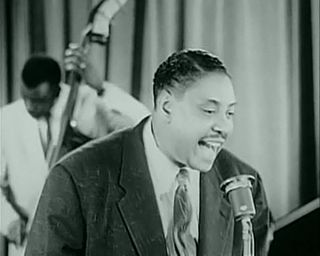
Rhythm and blues, frequently abbreviated as R&B or R'n'B, is a genre of popular music that originated within the African-American community in the 1940s. The term was originally used by record companies to describe recordings marketed predominantly to African Americans, at a time when "rocking, jazz based music ... [with a] heavy, insistent beat" was starting to become more popular. In the commercial rhythm and blues music typical of the 1950s through the 1970s, the bands usually consisted of a piano, one or two guitars, bass, drums, one or more saxophones, and sometimes background vocalists. R&B lyrical themes often encapsulate the African-American history and experience of pain and the quest for freedom and joy, as well as triumphs and failures in terms of societal racism, oppression, relationships, economics, and aspirations.

Ruth Alston Brown was an American singer-songwriter and actress, sometimes referred to as the "Queen of R&B". She was noted for bringing a pop music style to R&B music in a series of hit songs for Atlantic Records in the 1950s, such as "So Long", "Teardrops from My Eyes" and "(Mama) He Treats Your Daughter Mean". For these contributions, Atlantic became known as "the house that Ruth built". Brown was a 1993 inductee into the Rock and Roll Hall of Fame.

Harold "Chuck" Willis was an American blues, rhythm and blues, and rock and roll singer and songwriter. His biggest hits, "C. C. Rider" (1957) and "What Am I Living For" (1958), both reached No.1 on the Billboard R&B chart. He was known as The King of the Stroll for his performance of the 1950s dance the stroll.
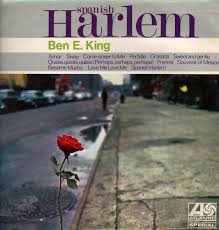
"Spanish Harlem" is a song recorded by Ben E. King in 1960 for Atco Records. It was written by Jerry Leiber and Phil Spector and produced by Jerry Leiber and Mike Stoller. "Spanish Harlem" was King's first hit away from The Drifters, peaking at number 15 on Billboard's rhythm and blues and number 10 in pop music chart.
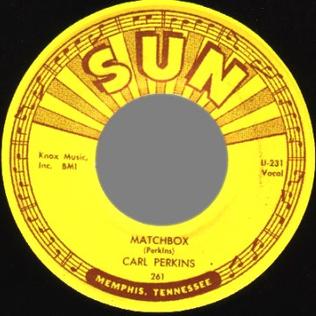
"Matchbox" is a song written and recorded by Carl Perkins and released in 1957. Blind Lemon Jefferson wrote and recorded a song entitled "Match Box Blues" in 1927, which is musically different but which contains some lyric phrases in common.
"Pledging My Love" is a blues ballad. It was written by Ferdinand Washington and Don Robey and published in 1954.

"Good Rocking Tonight" is a jump blues song originally released in 1947 by its writer, Roy Brown and was covered by many recording artists. The song includes the memorable refrain, "Well I heard the news, there's good rocking tonight!" The song anticipated elements of rock and roll music.
"Lemon Tree" is a folk song written by Will Holt in the late 1950s. Inspired by a Brazilian song, Meu limão meu limoeiro, originally written in 1930.
"That Lucky Old Sun (Just Rolls Around Heaven All Day)" is a 1949 popular song with music by Beasley Smith and words by Haven Gillespie.
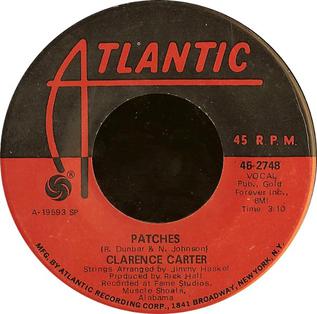
"Patches" (sometimes known as "Patches (I'm Depending On You)") is a country soul song written by General Johnson and Ron Dunbar and best known as the 1970 hit version by Clarence Carter. It won the 1971 Grammy Award for Best Rhythm & Blues Song.

"Grazing in the Grass" is an instrumental composed by Philemon Hou and first recorded by the South African trumpeter Hugh Masekela. Released in the United States as a single in 1968, it followed United States trumpeter Herb Alpert's vocal performance of "This Guy's in Love with You" to the top spot on the Hot 100 chart, ranking it as the 18th biggest hit of the year. The song also reached No. 15 Adult Contemporary. Masekela included the song in his albums Grazing in the Grass: The Best of Hugh Masekela (2001), Still Grazing (2004), and Live at the Market Theatre (2006).
Lucky Lips is a song written by Jerry Leiber and Mike Stoller. It was originally recorded by Ruth Brown in 1956 and was successfully covered by Cliff Richard in 1963.

"Hi-Heel Sneakers" is a blues song written and recorded by Tommy Tucker in 1963. Blues writer Mary Katherine Aldin describes it as an uptempo twelve-bar blues, with "a spare, lilting musical framework", and a strong vocal. The song's rhythmic approach has also been compared to that of Jimmy Reed. Tucker's lyrics recall the time he spent as a Golden Gloves boxer in the 1950s:
Priscilla Bowman was an American jazz and rhythm and blues singer, who had a No. 1 hit single on the Billboard magazine R&B chart in 1955 with the song "Hands Off". She was the lead singer for the Jay McShann band.
"Oh What a Dream" is a 1954 blues song written by Chuck Willis and originally performed by Ruth Brown backed by members of The Drifters. The single was Brown's fourth number one on the U.S. R&B chart.
George Henry Jackson was an American blues, rhythm and blues, rock and roll/rock and soul singer-songwriter. His prominence was as a prolific and skilled songwriter: he wrote or co-wrote many hit songs for other musicians, including "Down Home Blues", "One Bad Apple", "Old Time Rock and Roll" and "The Only Way Is Up". As a southern soul singer he recorded fifteen singles between 1963 and 1985, with some success.
Herbert J. Lance was an American jazz, blues and gospel singer, songwriter, record producer, recording studio owner and radio DJ. As well as recording several hits himself in the late 1940s, he co-wrote Ruth Brown's signature song, "Mama, He Treats Your Daughter Mean".
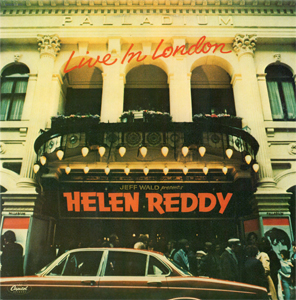
Live in London is the first live album by Australian-American pop singer Helen Reddy that was released in 1978 by Capitol Records and, as with her previous release, did not reach Billboard magazine's Top LP's & Tapes chart. On June 25, 2002, the album was released for the first time on compact disc.

Ruth Brown is the debut album by vocalist Ruth Brown featuring tracks recorded between 1949 and 1956 and released on the Atlantic label.
James Arthur "Boo" Hanks was an American Piedmont blues guitarist and singer. He was billed as the last of the Piedmont blues musicians.
References
- ↑ Whitburn, Joel (2004). Top R&B/Hip-Hop Singles: 1942–2004. Record Research. p. 87.
- ↑ Whitburn, Joel (2003). Top Pop Singles 1955–2002 (1st ed.). Menomonee Falls, Wisconsin: Record Research Inc. ISBN 0-89820-155-1.
- ↑ "Blind Lemon Jefferson – One dime blues". Genius.com. Retrieved March 1, 2019.
- ↑ Deffaa, Chip (1996). Blue Rhythms: Six Lives in Rhythm and Blues . University of Illinois Press. p. 35. ISBN 9780252022036.
Mama, He Treats Your Daughter Mean.
- ↑ "Cover versions of (Mama) He Treats Your Daughter Mean written by Herb Lance, Charles Singleton, John Wallace Jr". Secondhandsongs.com. Retrieved 13 January 2018.